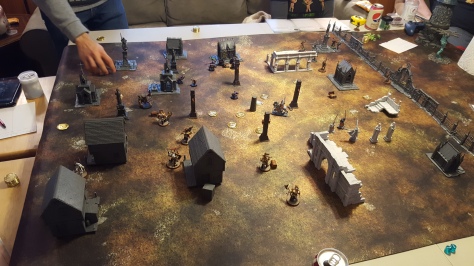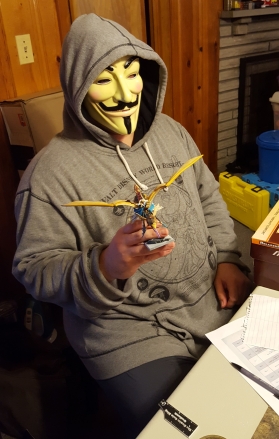Matt Hayward is a knowledgeable Warhammer player and a NEO with a background in roleplaying games. He recently ran a narrative event inspired by other events but tailored to fit his local group in the best example of what the Coalescence global narrative event aimed to encourage. What follows is his description of the event followed by the things he learned to run better events in the future. We want to share these insights with other NEOs.
Back in early November, the fifth of November, to be precise, I ran a narrative event for a couple friends. The plot revolved around a wizard named Guy Fawkes. I called the event “The Misbehaviors of the Great Wizard Fawkes.” It was heavily influenced by our own Aaron who also made an event inspired by Guy Fawkes.
It was originally intended to be a 3 round event. Round 1 was a 4-way free for all skirmish. Coins were scattered around the board and on objectives. The players fought to collect the most coins, which they would be able to spend in the next round. I didn’t want the players to get preoccupied with who won or lost, so victory points were only used to determine set up for round 2. The “winner” chose which player would place a unit first in Round 2. The 2nd place player chose whether placement order would be clockwise or counterclockwise. The 3rd place player was able to choose their deployment area. And the player who came in last chose each other player’s deployment area.
Round 2 was a 4-way Triumph and Treachery match, and each player made their army using the Path for Glory method. Once again, coins were spread all across the board. In this round, the players could spend coins on special spell scrolls and items. And of course, to keep everyone in the game, the Wizard Fawkes was willing to consider any other offers the players could think up.
The group took their time getting through Round 2, so the event was called there. However, Round 3 was intended to be a Siege battle. The two players with the most coins were going to be on a team defending their horde of coins. The other two players were on an unofficial team (aka, they could still attack each other), trying to steal the horde. Coins were still spread across the board, and the spells were still up for sale.
The narrative for Round 1 started with the discovery of Fawkes’ burial ground. Scouting parties were sent out to gather as many spoils and information as possible. This battleplan went extremely well. The players were torn between gathering coins, getting victory points, and fighting each other. Since victory points were only used to determine deployment for the next round, people still wanted to win for bragging rights, but the player that came in last had a blast determining the other player’s deployment zones. Also, giving the players a full round to gather coins was paramount.

In Round 2, Fawkes was awoken and was looking to cause trouble. Before the round started, we took a break for lunch, and I gave the players the spell scrolls. This started the players strategizing and already starting to work on secret alliances. This was the main round, and the players seemed to love every second of it. I was worried that players weren’t going to embrace the spell scrolls since the coins were ultimately used to determine the “winner.” However, that was not the case; my players were burning coins left and right. One issue I felt the round suffered from was the coin currency for the spells and the victory point currency for the treacheries. It would be much simpler to replace the spendable victory points with coins, and then slow the rate at which players gained victory points, or even getting rid of victory points altogether.
Unfortunately, we ran out of time, and had to call it after Round 2. However, Round 3 was meant to be the conclusion, were the 2 richest character were about to be run down. However, they were able to take refuge in a local fortress… the remains of Wizard Fawkes’ tower. Each defender was able to place 2 chests. One that was attached to their coins, and one attached to their ally’s coins. These chests had to be placed within the fortress, and all loose coins are spread outside of the fortress. In this round, if a player’s general was slain, then half of that player’s coins were spread within 3” of the general’s location. If an attacker got a hero within 1” of one of the chests inside the fortress, they rolled a dice, and that’s how many coins they took directly from the corresponding player. At the end, the player with the most coins would be declared the winner, and gained the favor of Fawkes in the future.
I think I learned a lot from this event. First and foremost, as an event organizer, I realized that I can have just as much fun, if not more, than my players. I can change anything, whenever I want. I can influence players to do something tactically unsound, for a reward next round. Not only was my role as Fawkes fun, but it was also important to keep my players involved by including a level of balance to make sure everyone was still enjoying themselves. Nothing can ruin the mood more than a player who brought an army they were super happy with, but was either not performing, or couldn’t stand up to a more competitive list that another player may have brought.

Another important factor was somewhat trivializing “victory.” In matched play, victory is typically the most important aspect of the game. In narrative, we should be focusing on the story of the game, the story of the player’s army, and the fun of the game. Victory should be the last thing we need to worry about in a narrative game. However, with that said, getting your teeth kicked in is never fun. This can be a very difficult balance to maintain, because you don’t want one player to get trounced to the point that they don’t want to play, but you don’t want to punish a player for having superior tactics. There’s no magic formula, or one specific way to maintain this balance. It’s up to the NEO to be sensitive to the situation and make the appropriate adjustments.
However, one of the most important things I learned was to feel free to change rules on the fly. All the game testing in the world will still fail to find all of the ways a player could abuse a mechanic. If you find yourself in that situation, consider adding a diminishing return, or a penalty for using the ability or mechanic consecutively, or something similar. This can also be tricky, because you don’t want to immediately shut off a mechanic other players are using and enjoying without abuse, but you also only have 4 or 5 rounds to change course. If you’re in a smaller game with friends, simply asking for the behavior to stop will more than likely be enough. Whenever running a game for strangers or acquaintances, you should give a warning that rules are changing, and begin the adjustment next round.

I tried to accomplish all of these with the spell scrolls I’ve mentioned throughout this article. I tried to add as many factors as I could think of; damaging spells that started at doing a little to a unit that went all the way to potentially dealing damage to everything on the table. Spells that effect weapon range, unit movement, healing, or even dealing damage to your own units in exchange for coins. One of my favorite spells was “Fail Boat, Ahoy!” This spell gave one of your opponents control of a Kharadron Overlord’s Arkanaut Frigate. They had full control, however, whoever had control of the frigate at the end of the game lost coins and victory points. The player in control of the frigate can pay 5 more coins than what the last player paid to give the current player control, in order to give the frigate to someone else. In my game, a player paid another player to purchase the scroll and give him the frigate. The entire game, the frigate was unable to do anything, and the other players basically avoided it. Then, at the end of the game, he desperately tried to get rid of it, but the other players kept bouncing it back until he was out of coins.

In the end, my friend with the least amount of experience (only 1 practice game a couple months prior) won with a High Aelf army! I had ordered a Guy Fawkes mask online, and presented it to him as a trophy for winning. It was a great experience. I can’t thank my players enough for embracing the spirit of the game, and having fun with the mechanics. Because of them, this event became one to remember. The only way I can think of to repay them is to make the next event even better!
Thanks for sharing, Matt. And readers can find the materials Matt created, including the pack and spell scrolls, on the page here.
